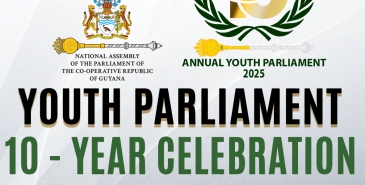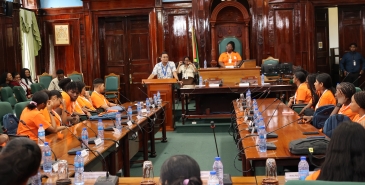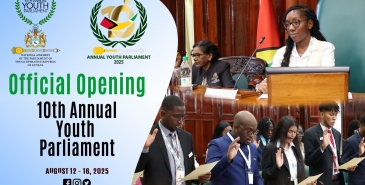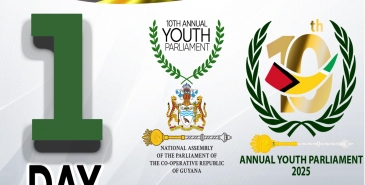CARIFORUM European Union Economic Partnership Agreement
Speech delivered at: 20th Sitting - Tenth Parliament - 10 May, 2012
10 May, 2012
10251
Minister of Foreign Affairs [Mrs. Rodrigues-Birkett]: Mr. Speaker, I rise to move this motion standing in my name regarding the ratification of the CARIFORUM European Union Economic Partnership Agreement. You will recall that negotiations for a new trading regime with the EU began in April 2004 and concluded on December 16th 2007. The Economic Partnership Agreement (EPA) replaces the trade provisions of the Cotonou Agreement which was signed in 2000 in which the European community granted the ACP countries non-reciprocal market access to Europe on more favourable terms than those enjoyed by goods of other countries. Guyana benefited from that special access arrangement, especially for its rice, sugar and rum among other products. However, the trading arrangements under Cotonou came to an end in December 2007 and there was a commitment by the EU to introduce a WTO compatible agreement after December 31st 2007. As such, this EPA is a reciprocal trade arrangement which replaces the non-reciprocal one of Cotonou agreement.
You will recall that prior to its signing the EPA generated robust debate in many circles. My own Government had serious issues with the agreement and we made known our positions. Indeed, apart from the more fundamental issues that have been adequately ventilated prior to our signing the agreement, we were concerned that there was not a provision in the agreement for review. We were very pleased that Guyana’s request to have a five-yearly review was accepted by the European Union almost in the final hours of the conclusion of that agreement. We are happy that a joint declaration was made and this is what it states:
“A comprehensive review of the agreement shall be undertaken not later than five years after the date of signature and at a subsequent five-yearly interval in order to determine the impact of the agreement, including the costs and consequences of implementation. We undertake to amend its provisions and adjust their application as necessary”
That being said, Guyana, together with the sister CARIFORUM countries signed the CARIFORUM-EU EPA in October 2008. I think Haiti signed a little bit later. In terms of the overall situation, I would like to touch briefly on what exists at present. As you are aware, the ACP (African, Caribbean and Pacific) did not negotiate as one group, it was divided into six negotiating groups, Eastern Africa, Western Africa, Southern Africa, Central Africa, the Pacific and CARIFORUM which comprise the fourteen CARICOM countries plus the Dominican Republic. The CARIFORUM Region remains the only one to have completed a comprehensive EPA with the EU as of now.
I should note that in 2007 the EU put in place a Council Regulation No. 1528 of 2007 which allowed ACP countries to have duty and quota free access to the EU market until full EPAs have been concluded and implemented. In 2011, that is last year, the EU put forward a proposal to amend that regulation for ACP countries which have agreed and initialled full or interim EPAs with the EU but had not yet signed or ratified these agreements. This new proposal which was adopted in September last year seeks to remove seventeen of the 36 countries from the list. However, if any of these seventeen countries proceed to take steps towards ratifying their interim EPAs or agree to full regional EPA by the first of January 2014 they will continue to benefit from the trade preferences under the 2007 regulation.
With effective lobbying and solidarity within the ACP group, the date has been pushed back to 2016. Of course I must say that the CARIFORUM group of which Guyana is a part is not affected because we have concluded a full EPA. However, the ACP solidarity was necessary and it is my firm view that this show perhaps that we should have gone together as one group, but that is water under the bridge now.
All ACP groups have reengaged in dialogue with the EU and there has been some progress in recent times Seashells, Mauritius, Madagascar and Zimbabwe have ratified EPAs. In terms of Guyana, the PPP/Civic Government takes very seriously the agreements to which we are partied. As such, since their signature of the EPA we immediately shifted our focus to implementation, not only in terms of complying with the necessary legal and administrative requirements, but more importantly, to look at how we can derive the promised benefits of the agreement.
It should be noted that the EPA was enforced as of January 2008 and that was in keeping with the WTO requirement to introduce this agreement after December 31st 2007 where the EU committed to have such an agreement introduce. However, CARIFORUM negotiated a three-year moratorium from January 1st 2008 to December 31st 2010 before entry into force of its faced tariff liberalisation commitments under the EPA from 1st of January 2011.
You will recall that my colleague the Hon. Member, Dr. Ashni Singh, came to the National Assembly with our Tariff Liberalisation Schedule and on January 15th 2011, we implemented the EPA Tariff Schedule for goods.
As far as I am aware we were the first country to do so thus demonstrating, as I said earlier, our commitment to implementing agreements once we have signed it, and also taking a leadership role in CARIFORUM.
Our Customs Act was appropriately amended and Guyana fulfilled the requisite obligations. We would have spoken about this before but since there are new parliamentarians, I think it is important that I mention what the tariff liberalization schedule is all about- what we actually negotiated. We negotiated that schedule with a view to safeguarding regional production capacity, revenue sensitivity and employment by way of our tariff exclusions and gradual phase-in treatment of a 25-year period that is from 2008 to 2033.
In terms of our tariff treatment of goods, first, there are products excluded from liberalisation, seventeen percent of imports from the EU. I should say tariff lines are excluded from liberalisation. These excluded products account for almost half of the duties and imports from the EU and include sensitive agricultural products such as milk, sugar, some vegetables, rice, most fish and meat products, most beverages, and a variety of non-agricultural products. This is intended to provide some breathing space and ensure that, in the medium to long term, local production of these products will not be displaced by imports from Europe. Almost all the products Guyana exports to other CARICOM members are also excluded from liberalisation by the region. This will ensure that these exports, again, will not be replaced by imports from Europe.
Secondly, of products that are fully liberalised, 60% of all imports or tariffs lines were liberalized immediately in January 2011. And thirdly, there are products that will be fully liberalised during a phased-out period over five to 25 years.
Let me say that based on the trade data from 2004, when the EPA negotiations commenced between CARIFORUM and the EU, to 2010, the last year of the three-year moratorium period, import trade with the EU played a minor role in Guyana. In 2011, our first year of EPA implementation, we have not witnessed any change in our trade with Europe. This must be seen in the context that it is not our largest trading partner, as I had mentioned too in the debate. Overall imports from the EU accounts for approximately 9% of total imports, while exports account for approximately 43% of our total exports.
An important aspect of the negotiation process leading up to the conclusion of the EPA was the necessary private/public sector consultations at the national and regional levels in CARIFORUM. Those wide ranging consultations were important for us to have not only public awareness, but, more importantly, political and technical input from civil society on what was a critical public policy issue. The need for civil society’s input and public participation is now even more critical in this implementation process. Given the limited resources not only of Guyana but of all our states and other bodies that have jurisdiction over trade related issues such as sanitary and phyto-sanitary measures, technical barriers to trade, customs competition policy and so on, the Ministry of Foreign Affairs will be relying on the cooperation and support of other Ministries and Agencies in this process. I should say, too, that at the regional level our Heads of Government, at an early stage following the conclusion of the negotiations, mandated the establishment of an appropriate technical unit in the Caribbean forum in the CARICOM secretariat to oversee the implementation of the EPA.
We recognise that the benefits of the Economic Partnership Agreement will not be realised with mere signing and ratification. We - and when I say we I refer to the public and the private sector, the non-state actors - will have to pursue trade opportunities with the European Union aggressively. It is not insignificant that we are a group of fifteen countries – fourteen from CARICOM and the Dominican Republic together with a population of just about 16 million of which nine million come from Haiti - having an agreement based on reciprocity with the largest trading block of 27 countries with a combined population of about 500 million people. Some would say there is no competition and the task is daunting. We, therefore, have to work very hard to increase and improve our productivity, and we are hopeful that the European Union will continue to support us as we make this transition. Much has happened since the signing of this agreement. Indeed, we had the financial and economic crisis that, needless to say, did not exempt any of us that signed the EPA, with some feeling the effects more than others, so much so that a few states even asked for the tariff liberalisation to be delayed.
That notwithstanding, if this motion is successful today, and I see no reason for it not to be, Guyana will be joining Antigua and Barbuda, Belize, Dominica and the Dominican Republic, as they have already ratified the agreement. Ten European Union member states have also ratified the agreement. More than that, I think Guyana will also once again be playing a leadership role in meeting our obligations under the EPA. With that I, therefore, humbly ask for the support of all the Members of this House so that we can complete this process of ratifying the agreement.
Thank you. [Applause]
Mrs. Rodrigues-Birkett (replying): I would like to thank the speakers, my colleagues, who have supported the motion before us.
I want to make a few comments based on some of what was said by the Hon. Members on the other side. Firstly, I would like to refer to the Hon. Member Mrs. Deborah Backer. She spoke about the several articles in the EPA relating to public procurement. I think that we are all aware that the Procurement Commission has been the subject of discussion in the talks between the Opposition and the Government, and I am advised that the parties have to submit names and this commission should be established by the end of June, 2012. There is some homework to be done on that side as well and I am sure that the articles she referred to would have further meaning.
Let me say that, yes, it is no secret that there were serious issues, and so on. The big issue I think for us was that the agreement we were negotiating was one of reciprocity when there are two very unequal sides. We would have preferred the proportionality among the unequal sides. That was one of the issues that we had. In every agreement there will be opportunities and we recognise that. How we are able to maximise those opportunities, we must consider. Let me say this, that after we signed that agreement we saw some things happened, but I believe that we can sort those things out with the EU, and this is why the review clause is important. For instance, some of our countries in Caribbean Forum (CARIFORUM) which did not require visas to enter some European countries were told that they are now required to get visas. Now if it is a partnership agreement, then one would imagine, if we have to get the very cultural industries that the Hon. Member Mr. Greenidge and Hon. Member Mrs. Backer referred to - if we are going to get our artistes out there - we only need to speak to some of our artistes and ask them how easy it is to get into some of those places. These are some of the non-tariff bars that we have to deal with but I think, in discussions, and so on, that we would be able to deal with some of these issues.
I would also like to say that the reason I mentioned that we signed the agreement in 2008 and how the other negotiating groups, together with our solidarity in CARIFORUM, were able to get that date pushed to 2016… I say no more. Because we knew what took place in 2008 and we have to be very careful sometimes when we speak of these things.
I want to, in particular, comment on something the Hon. Member Mr. Ramjattan said. He said that our negotiation should be based on national interest and not on the formidable of one person or foreign leaders. He was speaking in relation to our former President, President Jagdeo. Let me say that I was proud then and I am proud now of the position President Jagdeo took. The Hon. Member Mrs. Backer referred to the summit in Accra, Ghana, which I attended. Let me say that it was mere weeks before the agreement was finalised and, yes, it was not a comfortable situation to be in without the remainder of your CARIFORUM colleagues on your side, but I was very happy that the entire remainder of the ACP was on Guyana’s side. We can go back to those speeches made by the representatives of Nigeria, South Africa, Mauritius and all the others. It was there that the European Union accepted that there would be a joint declaration on the five-year review. It was not a visit, Hon. Member Mrs. Backer, in vain. We were very pleased that we were able to achieve that not only on behalf of CARIFORUM but the other negotiating groups are saying that this very provision must be, in any EPA that they could conclude.
Let me say that we have learned many things from that process, CARICOM in particular. We have learned that we must pay our own negotiators. We must not let the people who we are negotiating with pay our negotiators. We are now negotiating with Canada and we have taken that decision, because there were times when one could not differentiate from who is paying and who was negotiating. I must say that I saw some of that here today too. Let me say that one Minister is no longer here, but there is also a negotiator who is no longer there.
Notwithstanding the points that were made, we have all agreed that we are going to look at the EPA – look at the opportunities – look at ways that we could make use of those opportunities, bearing in mind some of the peculiarities and the dangers that exist. We are committed, on this side of the House, to continuing this dialogue with the EU. Let me say that there were countries which were against us, at the World Trade Organization (WTO). Perhaps at another time, maybe when we have got our act together and established the Committee on Foreign Relations we would be able to discuss why it is important that Guyana is now part of the Latin America and Caribbean Economic System (SELA) – the Latin American Caribbean group, because if we were discussing with some of those countries a bit more…
How could we explain then that we have a partial scope agreement with Brazil which is nonreciprocal in nature and other CARICOM countries can access that agreement through the one which we signed with Brazil? I am sure we could have been able to discuss with some of these countries – the Brazils, the Uruguays, the Ecuadors, and so on – on issues such as bananas, as some of our countries had to deal with, but now these things are being discussed. Let me say, as we speak, CARICOM is part of a SELA subcommittee dealing with tariffs for Latin America and the Caribbean. I think that it is important that here it is that a group of developing countries are dealing with issues that affect us and not having another set of countries being allowed to divide us.
I think that this is real progress. That being said, I ask for the support of the National Assembly to ratify this motion.
Speech delivered by:
What's New

17 August, 2025
10th Annual Youth Parliament Closes: Celebrating a Decade of Impact, Excellence, and Youth Empowerment10th Annual Youth Parliament Closes: Celebrating a Decade of Impact, Excellence, and Youth Empower

13 August, 2025
Youth Parliamentarians Assemble for Grand Rehearsals for the 10th Annual Youth Parliament

12 August, 2025
10th Annual Youth Parliament Kicks Off – Young Voices, Bold Ideas, Bright Futures!

11 August, 2025
10th Annual Parliament Kicks off tomorrow

